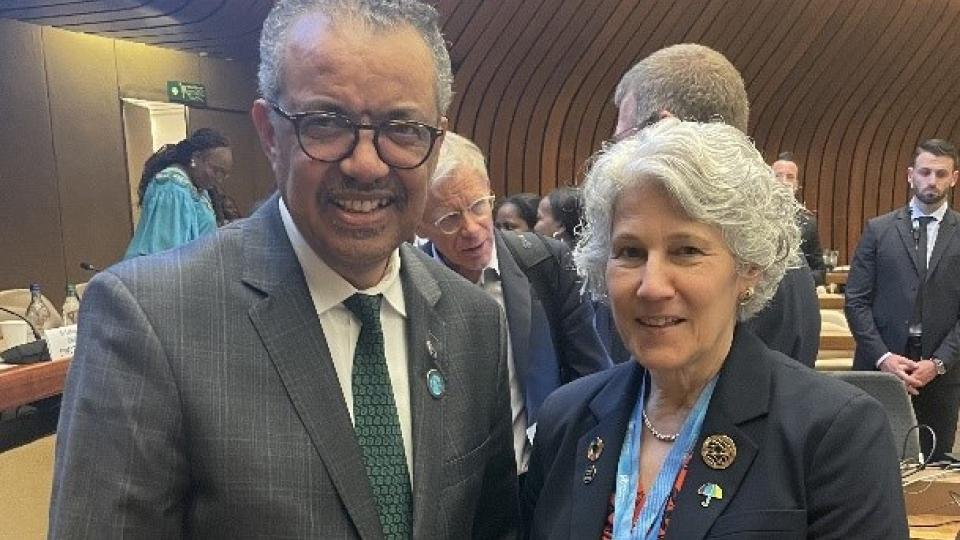ICN at the 76th World Health Assembly in Geneva, 23 May 2023

ICN President Dr Pamela Cipriano met with World Health Organization (WHO) Director General Tedros Adhanom Ghebreyesus at this week’s World Health Assembly (WHA) in Geneva. They discussed why investment in nurses is essential not just to recover, but also to rebuild health systems and deliver UHC2030.
ICN has a delegation of nurses at the WHA, with six delegates attending in person, and around 80 following the proceedings online.
On 23 May, Dr Pamela Cipriano and ICN Chief Executive Officer Howard Catton held discussions about the pressing issues facing nursing and health care with senior figures from around the world who are in Geneva for the WHA meeting. Topics covered included the COVID-19 pandemic, ICN’s Charter for Change, this year’s International Nurses Day theme, Universal Health Coverage and noncommunicable diseases. The Geneva visitors included:
- Australian Chief Medical Officer Professor Paul Kelly
- Barbados Foreign Minister Jerome X. Walcott and Acting Chief Nursing Officer (CNO) Annastacia Jordon
- Malawi Deputy Director of Nursing & Midwifery Lucy Mkutumula
- New Zealand CNO Lorraine Hetaraka
- Salvadorian CNO Ludys Mabel Soto de Zepeda and Vice Minister of Health Management & Development Carlos Alvarenga
- Nurses Association of Thailand President Siriorn Sindhu and esteemed colleagues
- President of the Romanian Order of Nurses, Midwives and Medical Assistants Mircea Timofte and Health Minister Dr Alexandru Rafila
- Malawi Barbados New Zealand El Salvador Romania Thailand
Dr Cipriano and Mr Catton also attended and contributed to various meetings at the Assembly, representing the position of nurses and nursing in various discussions and round table events. This included:
- Dr Cipriano attending the UHC2030 and International Federation of Red Cross and Red Crescent Societies side event From Commitment to Action: How the United Nations high Level Meeting is key to delivering Health for all session.
- Mr Catton attending the Global Health Council, Frontline Health Workers Coalition, Living Goods, and Pathfinder side-event Creating an Action Agenda: Advancing National Health Workforce Plans to Meet the Aspirations of the Global Political Declarations.
ICN intervention - Global Health for Peace Initiative
ICN Consultant Nursing and Health Policy Senior Advisor Erica Burton presented ICN’s intervention on the World Health Organization’s (WHO) Global Health for Peace initiative, which is intended to strengthen the role of WHO and the health sector as contributors to peaceful outcomes.
She said ICN welcomes the clarification of the revised roadmap and echoes what has been raised by other WHO Non-State Actors about the importance of strict adherence to the humanitarian principles of impartiality and neutrality under the implementation of the initiative.
She went on: “We also highlight the ICN #NursesForPeace campaign, emphasising the crucial role of nurses in advancing health equity in terms of access to health care services and the availability of health resources, which contribute to the preservation of peace.
‘ICN supports the health worker training mentioned in the roadmap, however, it should avoid adding further burden on the already fragile and overworked health workforce, and promote better protection of health care delivery and health care personnel.”
Ms Burton said a strong, long-term monitoring framework is needed for evaluating the effectiveness and impact of the initiative.
ICN intervention - Pandemic prevention, preparedness and response
On 23 May, the World Health Profession Alliance’s (WHPA) intervention on pandemic prevention, preparedness and response was presented to a roundtable discussion on the topic.
The intervention, presented on behalf of WHPA by Joannah C. Wengler, WHPA Secretariat Manager, highlights the severe impact that COVID-19 has had on the wellbeing of health professionals worldwide, and calls for urgent action to safeguard nurses and other health care workers.
The intervention cites evidence from WHPA’s recent report about the impact of the pandemic on the wellbeing of health professionals, and argues that protecting health care workers improves the resilience of health systems and their emergency planning and response.
It points out that the health workforce is also fundamental to the delivery of essential health services and public health functions in the pursuit of the overarching goals of Universal Health Coverage, global health security and WHO’s cancer initiatives.
The intervention calls on Member States to invest in strengthening mental health and psychological support for health professionals who are involved in pandemics and health emergencies, and for improved working conditions to be provided with safe, supportive working environments where qualified and experienced staff are retained and have access to continuing professional development.
It also calls for Member States to invest in systemic strategies to address violence in health care settings - particularly violence against women health workers - and to involve health professionals, especially women, in national planning, policy and finance decision-making, to help ensure that on-the-ground expertise informs decisions, and ultimately benefits both patients and health systems.
Download the communique here